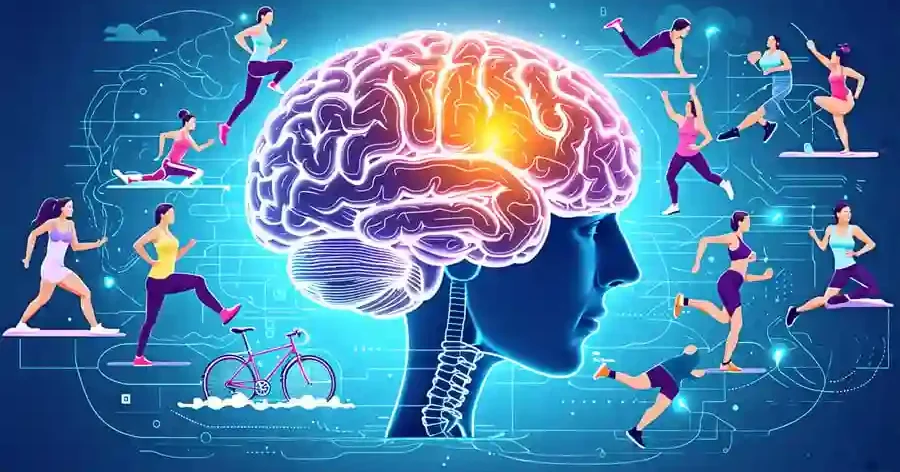When we think about exercise, the first things that come to mind are usually physical benefits like improving cardiovascular health, building muscle, and losing weight. However, the impact of regular exercise on mental health is equally significant, yet often overlooked. In fact, engaging in physical activity is one of the most effective ways to manage stress, boost mood, and improve cognitive function.
Whether it’s going for a run, taking a yoga class, or lifting weights at the gym, regular exercise can have a profound effect on your mental well-being. In this article, we will explore the many mental health benefits of exercise and why incorporating it into your daily routine can lead to a happier, healthier life.
- Improves Mood and Reduces Symptoms of Depression
Exercise as a Natural Antidepressant
One of the most well-documented benefits of exercise for mental health is its ability to improve mood and alleviate symptoms of depression. Numerous studies have shown that physical activity can be as effective as medication in treating mild to moderate depression. Exercise helps boost the production of endorphins, which are chemicals in the brain that act as natural painkillers and mood elevators.
Additionally, exercise promotes the release of other neurotransmitters such as serotonin and dopamine, which play a key role in regulating mood, feelings of happiness, and overall emotional well-being. This can result in reduced feelings of sadness, anxiety, and irritability.
How Exercise Helps Combat Depression:
- Endorphins: Known as “feel-good” hormones, endorphins are released during physical activity and can promote a sense of euphoria.
- Serotonin and Dopamine: These neurotransmitters help regulate mood and emotional responses, and their levels can increase with regular exercise.
- Stress Reduction: Exercise reduces levels of the stress hormone cortisol, which can contribute to feelings of depression and anxiety.
Even just a moderate amount of exercise, such as a brisk 30-minute walk, can improve mood and provide relief from depressive symptoms. Regular exercise can also help prevent future episodes of depression, making it a long-term strategy for managing mental health.
- Reduces Anxiety and Stress Levels
Exercise as a Stress Reliever
Regular physical activity is a powerful tool for managing anxiety and stress. When you exercise, your body’s response to stress is altered, and over time, regular activity can help you better cope with stressors. Exercise increases blood flow to the brain, which can help clear mental fog and provide a sense of clarity and calm.
Furthermore, exercise helps regulate the body’s response to stress. When you engage in physical activity, your body releases endorphins that promote relaxation, which can help lower feelings of anxiety. Exercise also reduces levels of cortisol, the hormone associated with stress, which helps you feel more balanced and less overwhelmed.
How Exercise Helps Reduce Anxiety:
- Physical Relaxation: Exercise helps release built-up tension in the muscles and promotes relaxation throughout the body.
- Endorphins: The release of endorphins during exercise helps reduce feelings of anxiety and creates a natural calming effect.
- Improved Sleep: Regular exercise improves sleep quality, which can reduce feelings of anxiety, as a lack of sleep often exacerbates anxiety symptoms.
Whether it’s a high-intensity workout or a calming activity like yoga, exercise helps reduce both short-term and long-term anxiety. Even a short walk can have an immediate calming effect on the mind.
- Enhances Cognitive Function and Brain Health
Exercise Boosts Brain Power
In addition to its effects on mood, exercise has a significant impact on cognitive function. Regular physical activity improves blood flow to the brain, delivering oxygen and nutrients that support the growth and development of brain cells. This increased circulation also helps to improve memory, focus, and overall cognitive performance.
Exercise has been shown to stimulate the production of brain-derived neurotrophic factor (BDNF), a protein that supports the survival of brain cells and the growth of new neurons. BDNF is crucial for learning, memory, and overall brain health, and it has been linked to the prevention of cognitive decline as we age.
How Exercise Boosts Cognitive Function:
- Increased Blood Flow: Physical activity improves circulation, which helps deliver oxygen and nutrients to the brain.
- Brain-Derived Neurotrophic Factor (BDNF): Regular exercise stimulates the production of BDNF, which is vital for brain health, memory, and learning.
- Neuroplasticity: Exercise promotes neuroplasticity, the brain’s ability to reorganize and form new connections, which enhances learning and memory.
Regular exercise has also been shown to improve executive functions, such as decision-making, problem-solving, and multitasking. So, not only does exercise benefit your body, but it also helps keep your brain sharp.
- Improves Self-Esteem and Body Image
Confidence Boost through Exercise
Engaging in regular physical activity can have a profound effect on self-esteem and body image. As you become stronger and fitter, you may notice physical changes that contribute to a more positive self-image. Whether it’s losing weight, gaining muscle, or simply feeling more energized, exercise can help improve your physical appearance, which in turn boosts your confidence.
Moreover, exercise helps you focus on what your body can do rather than on perceived flaws. As you set and achieve fitness goals, you build a sense of accomplishment and mastery, which contributes to improved self-worth and confidence.
How Exercise Improves Self-Esteem:
- Physical Transformation: Regular exercise can lead to weight loss, increased muscle tone, and improved posture, which can enhance body image.
- Sense of Accomplishment: Achieving fitness goals, such as running a 5k or lifting a certain weight, can improve self-esteem and foster a positive self-image.
- Empowerment: Regular exercise helps foster a sense of control over your body, which can lead to greater confidence and self-worth.
When you exercise, your body releases endorphins that create feelings of happiness and satisfaction, which can boost self-esteem. As your physical health improves, so does your mental well-being.
- Promotes Better Sleep
Exercise and Quality Sleep
Regular exercise can improve both the quality and quantity of your sleep, which has a significant impact on your mental health. Sleep is essential for cognitive function, mood regulation, and overall well-being. Poor sleep is often linked to increased levels of stress, anxiety, and depression, so improving your sleep through exercise can help prevent and alleviate these mental health issues.
Exercise promotes relaxation and helps regulate your circadian rhythm, making it easier to fall asleep and stay asleep throughout the night. However, it’s important to note that intense exercise close to bedtime may have the opposite effect, as it can temporarily increase adrenaline levels and make it harder to wind down.
How Exercise Improves Sleep:
- Promotes Relaxation: Physical activity helps release muscle tension and calm the nervous system, making it easier to fall asleep.
- Regulates Sleep Cycles: Regular exercise helps regulate your body’s natural sleep-wake cycle, leading to better sleep quality.
- Reduces Insomnia: Regular exercise can help alleviate symptoms of insomnia, leading to deeper, more restorative sleep.
A good night’s sleep plays a critical role in mental health, as it allows the brain and body to recover and reset. By improving your sleep patterns through exercise, you can reduce the negative impact of stress and anxiety.
- Social Interaction and Support
Exercise as a Social Activity
Exercise can also have a positive impact on mental health by providing opportunities for social interaction. Group fitness classes, team sports, and even walking or running with a friend can foster connections and provide a sense of community. Socializing during exercise helps reduce feelings of isolation and loneliness, which are often linked to depression and anxiety.
Moreover, exercise provides a shared goal and sense of accomplishment when done in a group setting. Whether it’s training for a race or completing a challenging workout together, these experiences can strengthen bonds and increase feelings of belonging.
How Social Interaction Enhances Mental Health:
- Sense of Belonging: Engaging in group exercise can foster a sense of community and belonging, reducing feelings of isolation.
- Emotional Support: Exercise provides opportunities for meaningful conversations and emotional support, which can help manage stress and anxiety.
- Increased Motivation: Exercising with others can boost motivation and adherence to fitness routines, making it more enjoyable and rewarding.
Whether it’s joining a fitness class, participating in a sports league, or simply exercising with a friend, social interaction during exercise can be a key factor in improving mental well-being.
Conclusion: The Mind-Body Connection
The benefits of regular exercise for mental health are vast and undeniable. From reducing symptoms of depression and anxiety to boosting cognitive function, improving sleep, and enhancing self-esteem, exercise plays a crucial role in supporting overall mental well-being. By incorporating physical activity into your routine, you can build resilience, improve mood, and foster a positive mindset.
Remember, you don’t have to commit to hours of intense exercise every day. Even moderate physical activity, such as walking, yoga, or cycling, can have significant benefits for your mental health. The key is to find an activity you enjoy and make it a regular part of your life.
By taking care of your body through exercise, you are also nurturing your mind, which can lead to a happier, healthier, and more fulfilling life.





